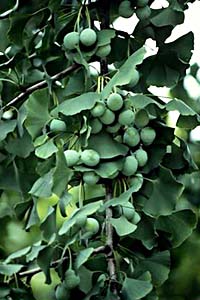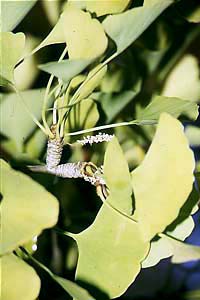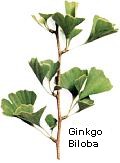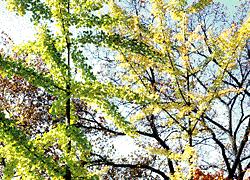Ginkgo Biloba by Mary Shipp
Americans today are taking an active role in managing their
health. Many Americans no longer rely totally on board certified medical doctors
and pharmaceutical drugs for treating their medical ailments and improving their
health. Therefore, the use of herbal and alternative therapies has increased
dramatically over recent years. Many people within America and abroad believe
that herbs can be used to treat medical ailments. In this paper, I will focus
on the herb ginkgo biloba. Should ginkgo biloba be used to treat medical ailments
associated with aging? Is it an effective treatment? I will explore those questions
and try to answer them.
|
The ginkgo biloba tree is the oldest living tree species.
"The leaves are double- or bi-lobed: hence the name biloba." (The Healing
Power of Vitamins, Minerals and Herbs, 1999). It is the last remaining
member of the Ginkgoaceae family. The ginkgo, also known as the maidenhair
tree, has been growing on earth for more than two hundred million years.
The ginkgo tree is now cultivated for its nut and its leaves. There is
a male and female ginkgo tree. In China and Japan, the nuts from the female
tree are considered a culinary delicacy with healing properties.
Extracts of leaves from the ginkgo tree have been used
in traditional Chinese medicine for over five thousand years. The extract
has been used to treat and prevent various medical conditions. The medical
form of the herb is made from dried leaves. Ginkgo biloba extract (GBE),
a concentrated form of the herb, is obtained by drying and milling the
leaves. A complex chemical process then extracts active ingredients from
ginkgo leaves. Terpene lactones and flavone glycosides are considered
to be the most important of the active ingredient.
There are many claims about the medical conditions might
be improved by the usage of ginkgo biloba. It is believed that ginkgo
biloba may have a role in treating memory impairments, Alzheimerís disease,
circulation
|
|

|
|
|
female ginkgo tree
|
|
|

|
|
|
male ginkgo tree
|
problems, vertigo, tinnitus, intermittent claudication, Raynaudís
disease, anxiety, altitude sickness, and varicose veins. Its use as a form of
treatment for asthma, sexual dysfunction, depressive disorders, and its use
immediately after stroke, are being investigated.
Ginkgo biloba is now a widely used medicinal drug throughout
the world. In particular, it is a commonly prescribed drug in Germany and France.
Ginkgo works by increasing blood flow throughout the body and
to the brain. It is a potent antioxidant that protects the body from free-radical
damage.
Michael Castelman stated in the book The Healing Herbs:
"medical excitement over ginkgo comes principally from the herbs ability to
interfere with the action of a substance the body produces called platelet activation
factor (PAF). Discovered in 1972, PAF is involved in an enormous number of biological
processes: asthma attacks, organ graft refection, arterial blood flow, and the
internal blood clots involved in heart attacks and some strokes. By inhibiting
PAF, ginkgo has been shown to have enormous healing potential, particularly
in conditions associated with aging." (278).
|
One such condition associated with aging is Alzheimerís
disease. There have been a number of studies conducted to determine the
effectiveness of ginkgo biloba as a form treatment for people who have
been diagnosed with Alzheimerís disease. The following is the definition
of Alzheimerís disease from the Gale Encyclopedia of Medicine: "Alzheimerís
disease (AD) is the most common form of dementia, a neurologic disease
characterized by loss of mental ability severe enough to interfere with
normal activities of daily living, lasting at least six months, and not
present from birth. AD usually occurs in old age, and is marked by a decline
in cognitive functions such as remembering, reasoning, and planning."
(Edition 1, 1999, p112)
The following are a few studies conducted on Ginkgo biloba
as
|
|

|
a form of treatment for Alzheimerís disease and for memory
loss:
The first study was published in The Journal of the American
Medical Association and is as follows:
"Subjects: Ginkgo ‚ Therapeutic use
Cognition disorders on old age- Care and treatment
Alzheimerís disease ‚ Care and treatment
Objective: To determine the effect of treatment with ginkgo
biloba extract objective measures of cognitive function on patients with Alzheimerís
disease (AD) based on formal review of the current literature.
Conclusion: Based on a quantitative analysis of the literature
there is a small but significant effect of 3-6 month treatment with 120mg to
240mg of G biloba extract on objective measures on formal clinical trials but
there are 2 case reports of bleeding complications. In AD, there are limited
and inconsistent data that preclude determining if there are effects in noncognitive
behavioral and functional measures as well as on clinicians global rating scales.
Further research in the area will need to determine if there are functional
improvements and to determine the best dosage. Additional research will be needed
to define which ingredients in the ginkgo extract are producing its effect in
individuals with AD." (Oken 402)
The following is an earlier study that was published in The
Journal of the American Medical Association.
"Objective: To assess the efficacy and safety of EGb in Alzheimer
disease and multi-infarct dementia.
Conclusions: EGb was safe and appears capable of stabilizing
and in a substantial number of cases, improving the cognitive performance and
the social functions of demented patients for 6 months to 1 year. Although modest,
the changes induced by EGb were objectively measured by the ADAS-Cog and were
sufficient magnitude to be recognized by the caregivers on the GERRI." (LeBars,
Katz, Berman, Itil, Friedman and Schatzberg 1327)
The following study was published in Pharmacopsychiatry:
"Abstract:
The efficacy of the ginkgo biloba special extract EGb 761 in
outpatients with presenile and senile degenerative dementia of the Alzheimer
type (DAT) and multi-infarct dementia (MID) according to DSM-III-R was investigated
in a prospective, randomized, double-blind, placebo-controlled, multi-center
study. After a 4-week run-in period, 216 patients were included in the randomized
24-week treatment period. These received either a daily oral dose of 240mg EGb
761 or placebo. In accordance with the recommended multi-dimensional evaluation
approach, three primary variables were chosen: the Clinical Global Impressions
(CGI Item 2) for psychopathological assessment, the Syndrom-Kurtest (SKT) for
the assessment of the patientís attention and memory, and the Nurnberger Alters-Beobachtungsskala
(NAB) for behavioral assessment ac activities of daily life. Clinical efficacy
was assessed by means of a responder analysis, with therapy response being defined
as response in at least two of the three primary variables. The data from 156
patients who completed the study in accordance with the study protocol were
taken into account in the confirmatory analysis of valid cases. The frequency
of therapy responders in the two treatment groups differed significantly in
favor of EGb 761, with p<.0.005 in Fisherís Exact Test. The intent-to-treat
analysis of 205 patients led to similar efficacy results. Thus, the clinical
efficacy of the ginkgo bilboa special extract EGb 761 in dementia of the Alzheimer
type and multi-infarct dementia was confirmed. The investigational drug was
found to be well tolerated." (Kanowski, Herrmann, Stephen, Wierich, Horr 29)
The following is from an article in Geriatrics: "The
herbal extract Ginkgo biloba appears to be safe, effective, and economical treatment
for memory disturbances that may lead to Alzheimerís disease (AD), according
to a group of U.S. researchers who have been studying the effects on cognitive
disorders of this drug that is commonly used in Europe." (16)
Finally, The following study was published in The Journal
of the American Medical Association. The abstract is as follows: "About
3 to 5 million Americans have dementia caused by Alzheimerís disease (AD) or
some other condition. Dementia is characterized by progressive cognitive impairment,
including memory loss that causes functional impairment in activities of daily
living. AD is the most common causes but it can only be diagnosed when other
causes of dementia are ruled out. The biggest risk factor for AD is age and
family history may also be important. Neurologic and mental status tests are
the best diagnostic tools. Potential treatments include donepezil, vitamin E,
selegiline, and Ginkgo biloba. Treatment with antidepressant or behavioral therapy
may also be effective." (Larson 1046).
|
I decided to conduct my own informal research study.
I choose three people who had either used ginkgo biloba for themselves
or had given it to a family member. I interviewed them in order to determine
their findings. The first person I interviewed, I will refer to him as
J, is a male in his early forties. J experienced two memory lapses about
eight months ago. On two separate occasions, J was not able to complete
his sentences because he would suddenly forget what he was talking about.
The memory lapses concerned J and he realized that overall there was a
difference with his short-term memory. At that point J decided to see
his doctor. His doctor listened to Jís description of his memory lapses
and, upon performing routine tests, could not determine the cause of the
memory lapses. J
|
|

|
was still concerned about the memory lapses and began reading
articles on ginkgo biloba. He felt that he had nothing to lose and so he began
taking the herb eight months ago.
J has not suffered a memory lapse in the last eight months.
He does notice an overall improvement of his memory bur cannot be certain that
ginkgo biloba cured him. He was not sure of the cause of his memory lapses therefore,
he cannot be certain that the herb had any impact on his memory lapses. But,
his not taking any chances, to this day, J continues taking ginkgo biloba on
a daily basis.
The second person I interviewed, I will refer to her as E,
is a female in her mid thirties. E began taking ginkgo biloba about six months
ago. Her daily dosage was 60mg per day. She took the herb for about two months.
At that point she decided it was not working and so stopped taking the herb.
I asked her to describe her symptoms and asked if there were no improvements
at all. E hesitantly admitted that she had not suffered from any major memory
problems. She was under the impression that it would just improve her memory.
The third person I interviewed, I will refer to her as N, has
a mother who was diagnosed with Alzheimerís four years ago. About two and a
half years ago, N decided to give her mother ginkgo biloba on a daily basis.
She gave her 120mg per day for about four months. She did not notice a difference
in her mother. In speaking with her motherís doctor, he mentioned that ginkgo
biloba as well as pharmaceutical drugs might help people in the early stages
of Alzheimer. Unfortunately, her motherís condition was too advanced. Due to
the circumstances, N decided not to give the herb to her mother any more.
There have been many studies, both in the US and in Europe,
conducted on the usage of ginkgo biloba as a form of treatment for ailments
associated with aging. Upon reviewing the research that I have gathered, I have
not found serious side effects associated with the usage of ginkgo biloba. While
the studies do not show dramatic results in patients, they do show some improvement
in patients. That is promising news. Further studies are needed to access in
greater detail the affects of the herb. It seems that there are many conditions
that might improve with the usage of ginkgo biloba. I just might begin taking
the herb to maintain my health.
Works Cited
Castleman, Michael. The Healing Herbs, New York: Rodale Press, 1991.
Duke, James. The Green Pharmacy. USA: St. Martinís Press, 1997.
Glisson, James, Rebecca Crawford and Shannon Street. "The Clinical Applications
of Ginkgo Biloba, St. Johnís Wort, Saw Palmetto, and Soy." The Nurse
Practitioner. June 1999: 28
"Ginkgo Biloba." National Institute on Aging. May 1998: 1.
"Herbal extract may offer safe and effective therapy for memory problems."
Geriatrics. January 1998: 16.
Kanowski S., WM. Herrmann, K. Stephen, W. Wierich and R. Horr. "Proof of
efficacy of the ginkgo biloba special extract EGb 761 in outpatients suffering
from mild to moderate primary degenerative dementia of the Alzheimer type
or multi-infarct dementia." Pharmacopsychiatry. March 1996: 47-56.
Larson, Eric. "An 80-Year-Old Man With Memory Loss. (Clinical Crossroads).
The Journal of the American Medical Association. February 2000: 1046.
LeBars, Pierre, Martin Katz, Nancy Berman, Turan Itil, Alfred Freedman
and Alan Schartzberg. "A placebo-controlled, double-blind, randomized trial
of an extract of Ginkgo biloba for dementia." The Journal of the American
Medical Association. October 1997: 1327.
Moore, Elizabeth. July, 21, 2000
Oken, Barry. "The Efficacy of Ginkgo biloba on Cognitive Function in Alzheimer
Disease." The Journal of the American Medical Association. February:
402.
Roberts, Nancy. July 21, 2000, Interview.
Robinson, Richard. "Alzheimerís disease." Gale Encyclopedia of Medicine.
1999.
Readerís Digest General Books. The Healing Power of Vitamins, Minerals
and Herbs. 1999.
Smith, Jay. July 20, 2000